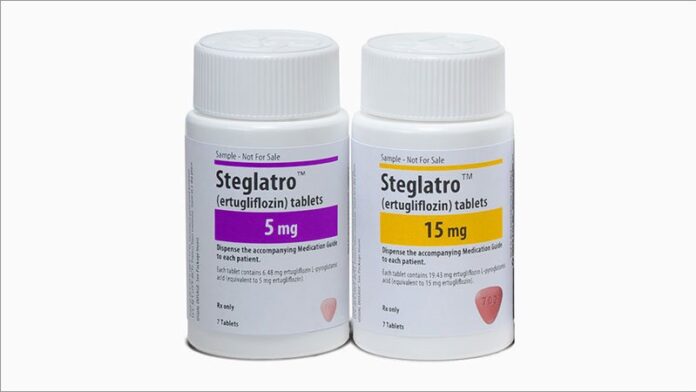[ad_1]
Ertugliflozin, the overlooked member of the US Food and Drug Administration–approved quartet of drugs in the sodium-glucose cotransporter 2 (SGLT2) inhibitor class, now has shown evidence of renal benefits roughly on par with the other three drugs.
Treatment of patients with type 2 diabetes and established atherosclerotic cardiovascular disease (CVD) with ertugiflozin (Steglatro) led to significant reductions in the incidence of four prespecified, exploratory kidney endpoints in the VERTIS CV trial, which included more than 8200 patients.
Most notable of the new exploratory analyses is a composite of time to a sustained 40% reduction from baseline in estimated glomerular filtration rate (eGFR) or time to renal dialysis, transplant, or death, the incidence for which was a significant 34% lower with ertugliflozin treatment compared with placebo during a mean 3.5 years of follow-up, David Z. I. Cherney, MD, PhD, and his associates report in Diabetologia.
These findings contrast with the result of the key secondary composite kidney endpoint in VERTIS CV, reported in 2020 along with the trial’s other main results, which showed a 19% point estimate for fewer renal events relative to placebo that was not significant.
The absence of a clear renal benefit from this member of the SGLT2 inhibitor class raised eyebrows when this result came out because it didn’t fit with the effects of the other agents in the class.
Table of Contents
Switching to a “More Precise Measure”
One reason for the change is an important shift in one element of the key secondary composite kidney endpoint, which included time to renal dialysis, transplant, or death, or time to doubling of baseline serum creatinine.
The prespecified exploratory composite endpoint in the new report swapped out time to doubling of baseline serum creatine and swapped in time to a sustained 40% reduction from baseline in eGFR.
(Time to doubling of baseline serum creatinine is generally accepted as corresponding to a 50% reduction from baseline eGFR.)
For this revised composite metric, there was an absolute reduction with ertugliflozin treatment compared with placebo of three events per 1000 patient-years of follow-up, an event reduction that appeared to be driven almost entirely by a 35% relative drop in the rate of a sustained 40% reduction from baseline eGFR.
The overall rate of diabetes-associated kidney disease progression among patients in VERTIS CV was low, and hence the power of the study was “insufficient” to show the level of kidney function loss needed to double serum creatinine, the authors explain.
“A sustained 40% decline from baseline in eGFR is an appropriate surrogate endpoint for kidney failure that allows for the accrual of more events in a shorter period of time,” they point out.
This means that a sustained 40% drop in eGFR “is likely a more precise measure, especially in a cohort at low risk for nephropathy progression.”
The report includes three additional prespecified, exploratory renal endpoints for which there was a significant beneficial effect from ertugliflozin treatment: the incidence of albuminuria progression during follow-up fell by 21% with ertugliflozin treatment relative to placebo; after 60 months of treatment, the urinary albumin/creatinine ratio was 16% lower in the ertugliflozin-treated patients relative to patients who received placebo; and after 60 months, the least squares mean change in eGFR was 2.55 mL/min/1.73m2 less with ertugliflozin compared with placebo.
Cherney first reported results from these exploratory analyses at the virtual annual meeting of the European Association for the Study of Diabetes in September 2020, as reported by Medscape Medical News.
The newly published article also presents a previously unreported tally of episodes of acute renal failure, which was reduced by 13% with ertugliflozin treatment relative to placebo, a difference that was not significant.
Ertugliflozin Falls Short on CVD Superiority
VERTIS CV randomly assigned 8246 patients with type 2 diabetes and atherosclerotic CVD from 567 sites in 34 countries to receive either of two dosages of ertugliflozin or placebo.
The trial’s primary efficacy endpoint was a composite of death from cardiovascular causes, nonfatal mycardial infarction, or nonfatal stroke, which occurred in 12% of patients who received either dosage of ertugliflozin and in 12% of those who received placebo. The results proved that ertugliflozin was noninferior to placebo for this endpoint but failed to show superiority.
These findings contrast with results from the cardiovascular outcome trials of the other three SGLT2 inhibitors (canagliflozin [Invokana], dapagliflozin [Farxiga], and empagliflozin [Jardiance]). With these three drugs, there was more robust evidence of superiority to placebo for various CVD outcomes.
The lack of a clear CVD benefit from ertugliflozin has prompted many experts to question the drug’s utility compared with that of other members of the SGLT2 inhibitor class.
On the other hand, ertugliflozin is more affordable. The US retail price is roughly 40% less than that of each of the three other agents in the class, a difference that can add up to an annual cost savings of about $2500 for patients who pay out of pocket.
VERTIS CV was sponsored by Merck and Pfizer, the companies that market ertugliflozin. Cherney has received honoraria from Merck, nonfinancial research support from Pfizer, and has had relationships with numerous other companies.
Diabetologia. Published online March 4, 2021. Full text
For more diabetes and endocrinology news, follow us on Twitter and Facebook.
You can also follow Medscape on Instagram, YouTube and Linkedin.
[ad_2]
Source link












